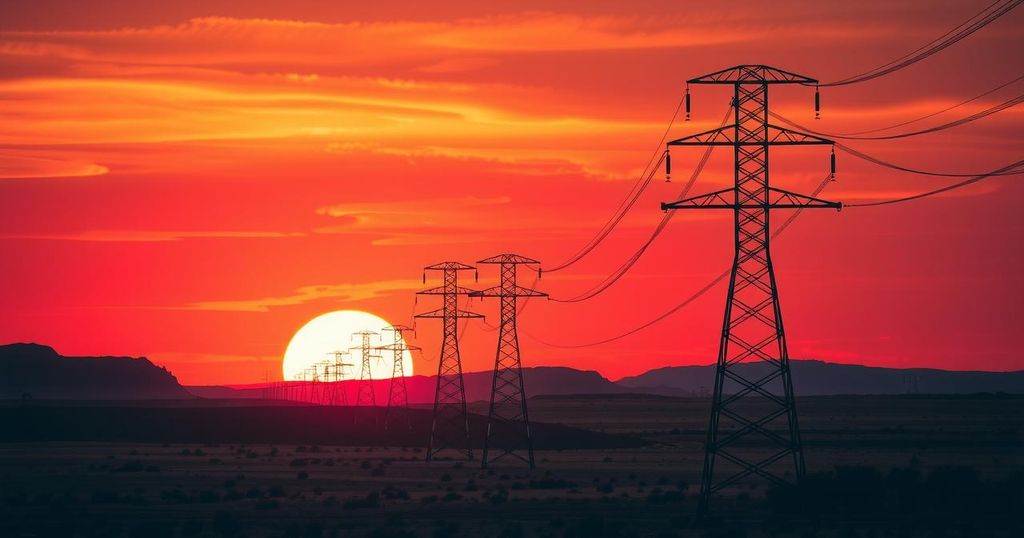The Trump administration has canceled Iraq’s exemption to pay for Iranian electricity, intensifying its “maximum pressure” campaign against Iran. This decision aims to prevent economic relief for Iran while urging Iraq to reduce its dependency on Iranian energy. Iraq faces operational challenges but is actively seeking alternatives, amid ongoing negotiations regarding energy stability and Kurdish oil exports.
On Saturday, the Trump administration officially canceled Iraq’s exemption that permitted the nation to pay for Iranian electricity. This action is part of the administration’s broader strategy, known as the “maximum pressure” campaign, aimed at curbing Iran’s economic abilities. A U.S. State Department spokesperson emphasized that this decision would prevent Iran from obtaining economic assistance.
The spokesperson stated: “The decision to let the exemption expire ensures that Iran will not receive any economic or financial relief.” This campaign is designed to end Iran’s nuclear ambitions, limit its ballistic missile capabilities, and stop its support for terrorism. Trump reinstated this policy following his return to office in January.
Amidst these developments, Iran has consistently denied any intent to develop nuclear weapons, asserting that its nuclear activities are solely for peaceful purposes. However, the U.S. seeks to tighten economic isolation on Iran to hinder its nuclear program development.
Farhad Al-Alaily, an advisor to Iraq’s Prime Minister, noted that the end of the exemption could create immediate challenges for Iraq’s energy sector. He conveyed that the government is proactively seeking alternatives to sustain electricity supplies.
Al-Alaily stated, “The government is actively working to find alternatives to maintain electricity supplies and mitigate any potential disruptions.” He emphasized Iraq’s commitment to strengthening energy security through domestic production and technological investments.
The U.S. has imposed various sanctions on Iran due to its nuclear initiatives and support for militant activities, posing a risk to nations that trade with Iran regarding their access to the American market. James Hewitt from the U.S. National Security Council reiterated President Trump’s firm stance: “President Trump has been clear that the Iranian regime must give up its ambitions to acquire nuclear weapons or face the policy of maximum pressure.”
Since 2018, when sanctions on Iranian energy exports were reinstated, Iraq was given temporary exemptions to continue purchasing energy from Iran. Both the Trump and Biden administrations have pressured Iraq to decrease its dependence on Iranian energy, which a State Department spokesperson reaffirmed recently.
The spokesperson urged the Iraqi government to reduce its reliance on Iranian energy, additionally asserting that “Iran is an unreliable energy supplier.” The U.S. has utilized the review of this exemption as leverage to prompt Baghdad to facilitate Kurdish oil exports via Turkey, intending to stabilize market supply against Iranian oil exports.
Negotiations for resuming oil exports from the semi-autonomous Kurdish region to Turkey are reportedly fraught with difficulties. The State Department spokesperson further highlighted potential opportunities due to Iraq’s energy transition, emphasizing the role of U.S. companies in enhancing energy productivity and reliability in these efforts.
In 2023, it was noted that imports from Iran only constituted 4% of Iraq’s total electricity consumption, underscoring the diminishing impact of Iranian electricity on Iraq’s grid.
In summary, the cancellation of Iraq’s exemption for Iranian electricity payments by the Trump administration represents a critical move in the ongoing pressure against Iran. The U.S. aims to diminish Iran’s economic capabilities while promoting Iraq’s search for energy alternatives. With the challenge to improve reliance on local energy sources, Iraq is navigating significant operational difficulties, but also potential opportunities for U.S. involvement in energy infrastructure. This scenario underscores the strategic geopolitical tensions and energy dynamics in the region.
Original Source: www.jordannews.jo






